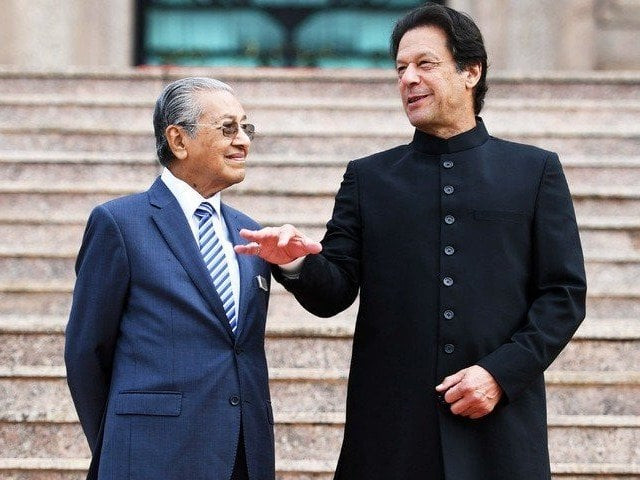PM Office ‘vetoed’ FO advice on Malaysia summit
Foreign Office forewarned about implications of accepting Kuala Lumpur summit invite, claim officials

Officials say PM’s Office was warned about implications of accepting invitation to Kuala Lumpur summit. PHOTO: FILE
Foreign Office officials told The Express Tribune on Sunday that the invite from Malaysian Prime Minister Mahatir Mohamad had been accepted despite a clear warning to the Prime Minister’s Office that the move would have implications.
Many, particularly former diplomats, were baffled whether or not the Foreign Office had forewarned the government about the implications of accepting the Kuala Lumpur summit invite without first taking Saudi Arabia into confidence.
Background interactions with senior Foreign Office officials, however, revealed that the Prime Minister’s Office had been forewarned about possible Saudi backlash.
Pakistan pulls out of KL summit to maintain 'neutrality'
The officials, who spoke on the condition of anonymity, told The Express Tribune that the Foreign Office had advised caution when the government received the invitation.
Not only that, the Foreign Office also wanted to avoid grandstanding over the Kuala Lumpur summit as Saudi Arabia and its Middle Eastern allies viewed it with a lot of suspicion.
The Prime Minister’s Office, instead of paying heed to the advice, confirmed Pakistan's participation, the officials claimed. “Had the government paid heed to the advice, Pakistan would not have faced embarrassment [on the diplomatic front],” said one official.
He said the government was informed in categorical terms that the decision to attend the Kuala Lumpur summit was bound to invite Saudi backlash.
“We had suggested to first assess the purpose and objectives of the summit,” the official said, but unfortunately before any homework, the prime minister had already consented to attending the summit in Malaysia.
Asked whether the prime minister was not aware of the political dynamics in the Muslim world, another official said: “In this government, the Foreign Office has little role in policymaking. Most of the decisions on foreign policy are being taken without consulting the Foreign Office.”
Pakistan won’t undermine Saudi interests, PM Imran assures MBS
The official referred to another instance when the Foreign Office’s advice had been ignored by the government.
In October, when an Afghan Taliban delegation, led by Mullah Abdul Ghani Baradar, had visited Pakistan, senior officials wanted to keep the visit low profile, with no media publicity.
But instead of listening to the senior officials, Foreign Minister Shah Mehmood Qureshi went out of the way to greet the Taliban delegation at the Foreign Office.
Images released by the Foreign Office showed Qureshi and a high-ranking security official embracing the Taliban leaders.
“This was an ill-advised move. It only goes to show that the Taliban were in our pocket. The Foreign Office never wanted such a spectacle,” the official added.
One of the reasons the Foreign Office advice is being ignored by the government is the incumbent foreign secretary.
Saudis pressure forced Pakistan to skip KL summit: Erdogan
According to insiders, Sohail Mehmood, unlike his predecessors, rarely asserts his authority. Many senior officials are upset and believe the Foreign Office is being held responsible for the blunders it has nothing to do with.
“When your prime minister takes decisions on foreign policy on the spur of the moment without first seeking advice from the Foreign Office, it is hard to avoid embarrassing situations like the one we witnessed over the Kuala Lumpur summit,” the official lamented.
Former Ambassador Abdul Basit was also surprised over the “mishandling” of the Malaysia summit issue.
He believes the government had accepted the invitation to attend the summit without looking into the pros and cons of the matter.
Basit, who has served as Pakistan’s ambassador to India and Germany, argued that the Foreign Office should have first done the spadework and consulted the Saudis through formal and informal channels before taking any decision.
The government's explanation for not attending the summit was that Pakistan wanted to maintain its neutrality. Foreign Minister Qureshi, while chatting with media persons last week, insisted that the decision was taken in the best national interest and looking at the larger picture.
Saudi Arabia rejects reports it pressurised Pakistan from attending KL Summit
He said the reason Pakistan stayed away from the summit was to avoid giving an impression that it was part of a certain group in the Islamic world. According to him, the Saudis believed the summit was an effort to create a new Islamic bloc, although Pakistan tried to convince Riyadh there was nothing like that.
The foreign minister claimed that Pakistan's decision not to attend the summit was not taken under Saudi pressure.
Turkish President Recep Tayyip Erdogan, however, claimed that Pakistan had skipped the summit because Saudi Arabia threatened to withdraw financial assistance and expel millions of Pakistanis working in the kingdom.
Saudi Arabia denied the claim as baseless and insisted it had neither threatened nor stopped Pakistan from attending the summit.
Nevertheless, the officials agree that Pakistan could have dealt with the issue maturely had the government taken the Foreign Office advice seriously.
Rejoinder
The Foreign Office said the report was “speculative, misleading and self-contradictory and based on opinions by unnamed officials”.
In a statement issued on Monday, the Foreign Office spokesperson pointed out that the report “betrayed lack of understanding of the exhaustive consultations process involved in important policy decisions and overlooked the extensive diplomatic outreach at multiple levels undertaken on this subject”.
He rejected the “insinuation of any gap between various offices.



















COMMENTS
Comments are moderated and generally will be posted if they are on-topic and not abusive.
For more information, please see our Comments FAQ